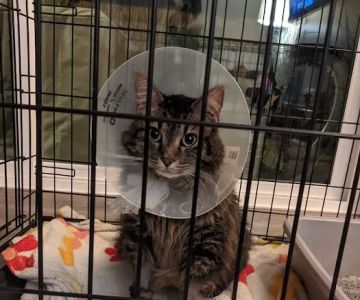Can Mushrooms Be Safe for Your Cat? A Veterinary Guide
As a cat owner, you may have found your feline friend curiously sniffing around your kitchen or garden, perhaps even eyeing some mushrooms. It’s common for pet owners to wonder: are mushrooms safe for my cat? In my experience as a cat lover, I’ve had moments where my cat showed interest in plants and food scraps, including mushrooms. This curiosity often leads to questions about whether mushrooms can be part of a cat's diet or whether they pose a danger. In this article, I’ll walk you through what mushrooms are safe for cats, which ones to avoid, and how to keep your cat safe while satisfying their natural curiosity.
1. The Dangers of Wild Mushrooms for Cats
First things first, the most important thing to know is that wild mushrooms can be highly dangerous to cats. Wild mushrooms, like those found in the woods or on the side of the road, can be toxic. They contain compounds that, when ingested by cats, can lead to severe illness, organ failure, or even death. Symptoms of poisoning can include vomiting, diarrhea, lethargy, loss of coordination, and seizures.
As a general rule, I always make sure that if my cat is outside, they are supervised and prevented from eating any plants or mushrooms. I once had an unfortunate experience with a neighbor's dog eating something they found in the garden, and while the dog was fine, it served as a reminder to always be cautious about mushrooms. The potential dangers posed by wild mushrooms make it essential to be vigilant, and if you believe your cat has ingested something toxic, it’s important to seek immediate veterinary care.

12410 Seal Beach Blvd Ste A, Seal Beach, CA 90740, USA
See Details2. Common Mushrooms That Are Safe for Cats
Not all mushrooms are harmful, but it’s essential to know which types are safe. Cultivated mushrooms, like the ones you find in grocery stores, are typically safe for cats in small quantities. Varieties like button mushrooms, portobello, and shiitake mushrooms are non-toxic to cats, and they can even offer some health benefits when included in a balanced diet.
For example, mushrooms like shiitake contain antioxidants and can support the immune system. However, it’s crucial to note that even safe mushrooms should only be offered to your cat occasionally and in moderation. Overconsumption of any food, even safe mushrooms, can cause digestive upset in cats.
3. How Mushrooms Can Benefit Cats in Small Doses
While mushrooms are not a staple food for cats, offering them occasionally as a treat in moderation can provide some health benefits. Mushrooms contain essential nutrients such as B-vitamins, fiber, and minerals that can support your cat's health. However, it’s important to note that cats are obligate carnivores, meaning their primary diet should consist of animal-based proteins, and mushrooms should never replace their regular food.
I’ve found that offering a small piece of cooked, plain mushroom as a treat once in a while has never caused any issues with my cats. However, I always ensure the mushrooms are cooked without any seasoning, butter, or oil, as these can be harmful to cats. Raw mushrooms should be avoided as they can be difficult for your cat’s digestive system to process.
4. The Role of Veterinarians in Cat Diet Safety
If you’re ever unsure about what foods are safe for your cat, consulting with a veterinarian is always the best course of action. Veterinarians can provide personalized advice on what foods are appropriate for your pet, taking into account their health, age, and any specific dietary needs. I remember bringing my cat to the vet when I wanted to try adding new ingredients to her meals, and the vet provided valuable insights on safe options, including mushrooms.
Some veterinarians even suggest specific types of mushrooms as part of a cat's supplementary diet, especially if the cat has health concerns that mushrooms may help support. However, only a licensed vet should guide you on this matter, ensuring that any dietary changes are safe for your cat.
5. Signs Your Cat Might Have Ingested a Toxic Mushroom
If you suspect that your cat has ingested a toxic mushroom, it’s essential to act quickly. Symptoms of mushroom poisoning in cats can vary but typically include vomiting, diarrhea, drooling, lethargy, and changes in behavior. If you notice any of these signs, contact your veterinarian immediately.
In one instance, a friend’s cat accidentally ate a wild mushroom while outside, and the symptoms of poisoning became apparent within hours. Thankfully, they took their cat to the vet in time, and with immediate treatment, the cat recovered. This experience reinforced the importance of keeping a close eye on your pet and ensuring they don’t have access to unsafe food.
6. Tips for Keeping Your Cat Safe from Toxic Mushrooms
To ensure your cat stays safe, here are a few tips to keep in mind:
- Supervise outdoor play: When your cat is outside, monitor them closely to prevent them from eating anything harmful, including mushrooms.
- Remove wild mushrooms: If you notice wild mushrooms growing in your yard, make sure to remove them to prevent your cat from coming into contact with them.
- Limit mushroom intake: Only offer store-bought mushrooms to your cat, and make sure they are fully cooked without any added ingredients like butter or seasoning.
- Consult your veterinarian: If you have concerns or want to incorporate new foods into your cat’s diet, always ask your vet for advice.
Ultimately, mushrooms can be a safe treat for cats when prepared correctly and given in moderation. However, it’s always essential to remain cautious and ensure that any mushrooms your cat consumes are non-toxic and appropriate for their dietary needs.










